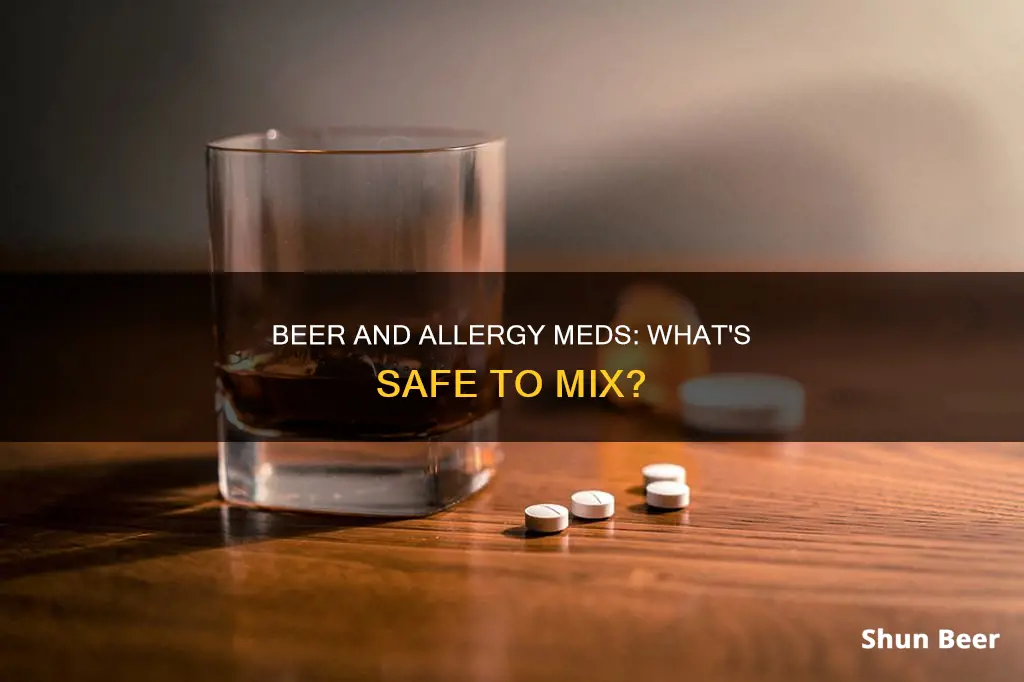
Drinking alcohol while taking allergy medicine is generally not recommended, as it can lead to negative side effects and health risks. The combination of alcohol and antihistamines, a common type of allergy medication, can cause drowsiness, impair coordination and reaction speed, and increase the risk of accidents. Alcohol may also reduce the effectiveness of antihistamines in treating allergy symptoms.
First-generation antihistamines, such as Benadryl, should never be mixed with alcohol due to the increased risk of severe drowsiness and other dangerous side effects. While second-generation antihistamines like Claritin, Allegra, or Zyrtec are considered relatively safer, caution is still advised as individual reactions may vary.
It is essential to consult a healthcare professional or read the medication's label to understand the potential risks and side effects of mixing alcohol with allergy medicine.
| Characteristics | Values |
|---|---|
| Mixing first-generation antihistamines with alcohol | Should be avoided due to the increased risk of drowsiness and potential for dangerous side effects |
| Mixing second-generation antihistamines with alcohol | Considered safer but caution is still advised as individual reactions may vary |
| Nasal corticosteroids and alcohol | Recommended alternative for those wishing to consume alcohol as they don't typically cause drowsiness or negatively interact with alcohol |
| Alcohol and antihistamines impact on the body | Both are central nervous system depressants, which can lead to confusion and lethargy |
| Alcohol and antihistamines side effects | Drowsiness, loss of consciousness, dehydration, impaired learning and memory, increased risk of overdose |
What You'll Learn
- First-generation antihistamines like Benadryl and alcohol don't mix
- Second-generation antihistamines and alcohol may be safer, but caution advised
- Alcohol may trigger an allergic reaction, especially for those with asthma
- Combining antihistamines and alcohol may lead to dehydration and misuse
- Women are more susceptible to alcohol-related harm when mixed with antihistamines

First-generation antihistamines like Benadryl and alcohol don't mix
Drinking alcohol while taking allergy medicine is generally not recommended, especially if your allergy medication of choice is diphenhydramine, also known as Benadryl. Benadryl is a first-generation antihistamine, and mixing it with alcohol can lead to severe drowsiness and other dangerous side effects.
First-generation antihistamines like Benadryl work by affecting the histamine receptors in the brain and spinal cord. One of their defining characteristics is that they cross the blood-brain barrier, which can lead to side effects such as sleepiness. When combined with alcohol, which also causes drowsiness, the chances of experiencing a double dose of this side effect become very high. This can not only impair your ability to function and increase the likelihood of accidents but can also lead to unconsciousness.
In addition to drowsiness, other side effects of first-generation antihistamines include lowered blood pressure and increased heart rate. These medications can also affect the central nervous system, leading to confusion and compromised thinking. When combined with alcohol, which also impacts brain communication, the side effects can be amplified, increasing the risk of accidents and other adverse reactions.
While second-generation antihistamines, such as Claritin, Allegra, or Zyrtec, are considered slightly safer to mix with alcohol, caution is still advised as individual reactions may vary. These medications generally cause fewer side effects and have a reduced or absent risk of sleepiness. However, it is still recommended to avoid alcohol consumption while taking any medication, including second-generation antihistamines.
If you are looking for an alternative allergy treatment that is safer to use with alcohol, nasal corticosteroids like Flonase or Nasonex are recommended. These medications are used as needed, can be used regularly during allergy season, and do not typically cause drowsiness or negatively interact with alcohol.
Should Children Drink Light Beer at Home?
You may want to see also

Second-generation antihistamines and alcohol may be safer, but caution advised
Second-generation antihistamines, such as Claritin, Allegra, or Zyrtec, are considered safer to mix with alcohol than first-generation antihistamines. However, caution is still advised, as individual reactions may vary. While second-generation antihistamines are less likely to cause drowsiness, consuming alcohol with these medications can still lead to enhanced side effects, such as extreme drowsiness, impaired coordination, and increased risk of accidents.
Second-generation antihistamines are generally safer because they cause fewer side effects than first-generation antihistamines. First-generation antihistamines, like Benadryl, can affect the central nervous system, leading to drowsiness, confusion, and compromised thinking. On the other hand, second-generation antihistamines, such as cetirizine and loratadine, have a reduced risk of causing sleepiness.
However, it is important to note that alcohol consumption can still enhance the side effects of second-generation antihistamines. For example, while Claritin may not cause drowsiness on its own, mixing it with alcohol can lead to feelings of tiredness or sleepiness. Additionally, Claritin may interfere with the liver's ability to process alcohol, increasing the risk of an overdose if excessive alcohol is consumed.
Therefore, while second-generation antihistamines and alcohol may be safer than first-generation antihistamines and alcohol, it is still important to exercise caution. It is always advisable to speak to a doctor or pharmacist to understand the potential risks and side effects of mixing medication and alcohol.
Beer and Steroids: Safe Mix?
You may want to see also

Alcohol may trigger an allergic reaction, especially for those with asthma
While alcohol allergy is rare, alcohol intolerance is more common. Alcohol intolerance is caused by a genetic condition that prevents the body from breaking down alcohol efficiently. Alcohol intolerance can cause immediate reactions, including a stuffy nose, skin flushing, facial redness, an upset stomach, and nasal congestion.
For people with asthma, consuming alcoholic beverages can worsen their symptoms. A Swedish study found that alcohol might worsen nasal allergy symptoms. Additionally, a preservative called sodium metabisulfite, commonly found in beer, wine, and spirits, may cause people with asthma to wheeze. Up to a third of people with asthma report that their asthma symptoms worsen after consuming alcohol.
Furthermore, histamines, which are chemicals released by the immune system during allergic reactions, can form during the production of alcoholic beverages. Consuming alcohol might therefore increase the risk of an allergic reaction, especially when combined with allergy medication.
First-generation allergy medications, such as Benadryl, are known to cause drowsiness and should never be mixed with alcohol. Second-generation allergy medications, such as Claritin, Allegra, or Zyrtec, are considered safer to combine with alcohol, but caution is still advised due to potential individual variations in reactions.
Blood Thinners and Beer: Is It Safe?
You may want to see also

Combining antihistamines and alcohol may lead to dehydration and misuse
Both alcohol and antihistamines can cause dehydration, and when combined, this effect is exacerbated, increasing discomfort and worsening a hangover. Antihistamines are also known to be misused as sleeping pills, and when combined with alcohol, this misuse is more likely to occur.
Additionally, both substances can impair your senses and motor skills, increasing the risk of accidents and injuries. Older adults are at a higher risk of experiencing these adverse effects. Women are more susceptible to alcohol-related harm due to their bodies containing less water, resulting in a more concentrated amount of alcohol in their system.
Furthermore, antihistamines and alcohol can negatively impact learning and memory. Antihistamines block the action of acetylcholine, a neurotransmitter essential for cognitive processes. Alcohol also inhibits learning and memory. When combined, these substances may have a more noticeable detrimental effect on cognitive function.
It is crucial to consult a doctor or pharmacist about potential side effects and avoid mixing medications and alcohol without proper guidance. While second-generation antihistamines like Claritin, Zyrtec, and Allegra are considered slightly safer with alcohol, caution is still advised due to individual variations in reactions.
Beer and Skin Rashes: Is There a Connection?
You may want to see also

Women are more susceptible to alcohol-related harm when mixed with antihistamines
Drinking alcohol while taking allergy medicine is generally not recommended due to the potential for negative interactions and side effects. First-generation antihistamines, such as Benadryl, can cause drowsiness and sedation, and when combined with alcohol, these side effects may be intensified, leading to impaired coordination and reaction speed, loss of consciousness, and increased risk of accidents.
Now, addressing the specific question about women being more susceptible to alcohol-related harm when antihistamines are in the mix:
Women are generally more susceptible to alcohol-related harm compared to men. This is primarily due to the difference in body composition, specifically the amount of body water. On average, women have lower body water content than men, which means that when a woman and a man consume the same amount of alcohol, the concentration of alcohol will be higher in the woman's body. As a result, women experience greater alcohol-related damage to organs such as the liver.
When antihistamines are introduced into the mix, the risks for women increase further. Antihistamines, particularly first-generation ones like diphenhydramine (Benadryl), can affect the central nervous system and cause side effects such as drowsiness, sedation, confusion, and impaired thinking. When combined with alcohol, these side effects can be intensified, and women may experience more severe adverse interactions due to the higher concentration of alcohol in their bodies.
Additionally, both alcohol and antihistamines can cause dehydration, and when combined, this effect may be exacerbated. Dehydration can increase discomfort and worsen hangover symptoms.
Furthermore, antihistamines can interfere with learning and memory by blocking the action of acetylcholine, a neurotransmitter essential for cognitive processes. Alcohol also inhibits learning and memory temporarily. Therefore, consuming alcohol while taking antihistamines may have a more noticeable negative impact on a person's cognitive abilities, and women may be more susceptible to these effects due to the higher concentration of alcohol in their bodies.
In conclusion, women are generally more vulnerable to alcohol-related harm due to their lower body water content, and when antihistamines are introduced, the risks are heightened. The combination of alcohol and antihistamines can lead to a range of adverse effects, including intensified sedation, dehydration, and cognitive impairments. To ensure safety, it is generally recommended to avoid mixing alcohol and antihistamines, especially for women who are more susceptible to the potential harms.
Beer and Meclizine: Safe Mix or Health Risk?
You may want to see also
Frequently asked questions
It depends on the type of allergy medicine you are taking. First-generation antihistamines like Benadryl should never be mixed with alcohol due to the risk of severe drowsiness and other dangerous side effects. Second-generation antihistamines, such as Claritin, Allegra, or Zyrtec, are considered safer with alcohol but caution is still advised as individual reactions may vary.
Mixing allergy medicine and alcohol can increase the chances of impairing your senses, leading to accidents and even life-threatening situations. Both substances can also cause dehydration, and their effects on brain communication and central nervous system function can result in confusion and lethargy.
Nasal corticosteroids like Flonase or Nasonex are recommended alternatives for those wishing to consume alcohol. These medications don't typically cause drowsiness or negatively interact with alcohol.
Women, older adults, and people with certain conditions such as alcohol use disorder are more likely to experience serious alcohol-medication interactions. Additionally, females are generally more susceptible to alcohol-related harm due to the higher concentration of alcohol in their bodies.
In the case of a severe allergic reaction, such as hives and swelling of the face or tongue, it is necessary to take an antihistamine like Benadryl and seek immediate medical attention. This situation may be a medical emergency.







